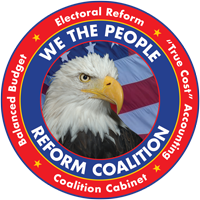 Definition of ‘True Cost Economics'
Definition of ‘True Cost Economics'
An economic model that seeks to include the cost of negative externalities into the pricing of goods and services. Supporters of this type of economic system feel products and activities that direct or indirectly cause harmful consequences to living beings and/or the environment should be accordingly taxed to reflect the somewhat hidden costs.
Adbusters.org, undated
Kick It Over!
We need a new economic paradigm – one that is open, holistic, and human scale – and this website offers a blueprint for getting there. Prepare yourself with some background information about economics in the Old paradigm and New paradigm sections then roll up your sleeves and launch into action on your campus.
Ecological economics pioneer Robert Costanza likens conventional economics to a bucket full of water that's ready to tip. All it needs is one sharp jolt. So, let's kick it over.
The economic revolution begins with jamming Economics departments. It ends with an entirely new way to measure progress.
Sign the True Cost Economics Manifesto
Utne Reader, 26 August 2011
Economics, in its current form, is a very limited science. Classical economists are accustomed to quantifying cost in gain in simple monetary terms while ignoring the more sweeping ramifications of a particular decision. Air pollution, for example, costs residents of Ontario at least $1 billion a year in medical costs and missed work, but these figures do not make their way into the analysis of the businesses doing the polluting. Neither does the appalling destruction that China is currently wreaking on the environment, the cost of which damage more than outweighs the country's rapid economic growth. There is no room for such crucial factors in neoclassical economics, the predominant school of economic thought that assumes that people's decisions are guided by totally rational thought processes. Clearly, the destruction of one's habitat is not an entirely rational decision to make, and critics blast the isolated, ‘autistic' manner in which modern economics employs a narrow scope and and a limited conception of cost and value.
A number of economists, fed up with the limitations of classical economics, have put forth a new paradigm; in which pricing includes a number of factors beyond an item's market value. The environmental cost of aviation, for example, adds at least $500 per passenger to airline travel. Recent mad cow scares have cost the cattle industry $6 billion dollars, and a World Health Organization study of France, Switzerland, and Austria found that 1.7 percent of the GDP was taken up by the costs of traffic pollution. By using these figures to paint a more complete picture of the transportation and cattle industries, economists will be able to more easily create value, not just in terms of raw profitability, but in terms of overall health and environmental impact. In fact, the new paradigm substitutes the more broad Genuine Progress Indicator (GPI) for the limited Gross Domestic Product, factoring leisure time, crime, and resource depletion into the measurement of a nation's success. With global warming racking up a yearly bill of $304.2 billion, businesses would be forced to take note of their own environmental practices in a way that the current model does not encourage. True Cost Economics is currently creating a sizable ruckus in the academic world, and its value as a system of thought is starting to be recognized by the economic establishment.
See Also:
1993 Corporate Role in National Competitiveness: Smart People + Good Tools + Information = Profit
2008: Creating a Smart Nation (Full Text Online for Google Translate)
2012 Reflexivity = Integrity: Toward Earth/Life 4.0
Graphic: “The True Cost of Coal”
Graphic: True Cost of a Cotton T-Shirt
John Robb: Toyota Prius is NOT (Not) a Resilient Car
John Steiner: Declaration of Occupation of NYC + Revolution USA RECAP
Journal: Is Money Evil? Who Decided Gold Was Valuable?
Journal: “True Cost” Meme Gaining Ground
Journal: True Cost of UK National Debt
Journal: True Cost of US Government Ineptitude
Rebuilding the American Economy with true cost accounting
Reference: Infinite Wealth for All
Reference: Transparency Killer App Plus “Open Everything” RECAP (Back to 01/2007)
Reference: WATER–Soul of the Earth, Mirror of Our Collective Souls
Review: Deep Economy–The Wealth of Communities and the Durable Future
Review: Resilience and the Behavior of Large-Scale Systems
Review: Sacred Economics – Money, Gift, and Society in the Age of Transition
Review: The Philosophy of Sustainable Design
Search: “the truth at any cost reduces all other
Search: cost of corruption + Corruption RECAP
True Cost – Analyzing our economy, government policy, and society through the lens of cost-benefit
True Cost: Cost of food-borne illnesses is deemed much higher than earlier estimates
Wikipedia / Full Cost Accounting



